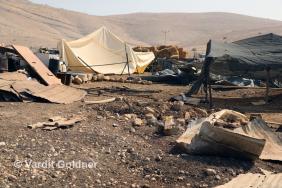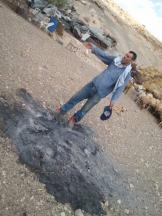Halt Makhul . Hamra, Tayasir 2.10.2013
Translator: Charles K.
Halt Makhul
The inhabitants of Makhul in the Jordan Valley have been exposed to the burning sun for the past 18 days. The average temperature this month in the area is 33 degrees centigrade. In such conditions, people must drink a lot of water and remain in the shade. There’s been no water here for years, because Israel has diverted all of it to the settlements, and now there’s no shade either. On 16.9.13, Israel demolished all the tents and tin shacks of Makhul village. Since then it’s been preventing any humanitarian assistance to the residents, with threats and with actions.
On 24.9.13, the High Court ordered that the structures not be demolished nor the inhabitants expelled before a hearing. The State is scheduled to respond 8.10.13. But there’s the High Court, and there’s the state of Israel – the army still prevents any assistance, and last night the evil reached new heights – 30 soldiers arrived in the middle of the night and tore the plastic sheeting attached to poles on four temporary shelters which barely deserve to be called tents (see photos) and burned three heaps of straw along with the sheeting in front of the inhabitants (the photo shows the remnants of the fire).
More than 100 men, children, elderly people and women have been dumped in the sun, and we remain silent?
More than 1000 sheep and goats have been left without shelter, and we remain silent?
Twelve sheep have died from sunstroke. Are we waiting for people to die also? Winter is coming, and for the first time in their life people are praying it won’t rain. The lambing season begins next week. In such conditions, the lambs and kids will die. And we remain silent?
Ethnic cleansing is underway in the Jordan Valley. The inhabitants are being expelled from their homes, and not only from Makhul: in Humesa, where homes were demolished in August; in el Hadidiya, where Salamin’s tent was destroyed twice in July; in Ras el Ahmar and in many other locations such as al-Azaim, in Area E1, which this week was demolished again.
Halt Makhul is not a Bedouin encampment. It was an actual village with stone buildings, cultivated fields and sheep, long before 1967. In 1969, as part of the Alon Plan, the state demolished the village, and since then the inhabitants have been living in tents and fighting for the right to live on their land. The state also sealed the water cisterns, and the residents have since then been living on 30 liters of water/person/day which they bring in tankers (the minimum water supply determined by the World Health Organization is 100 liters/person/day).
This time Israel outdid itself by destroying the entire village where ten families lived, each with ten members. Nor did it end there – Israel continues harassing them repeatedly to make them leave.
Gitit checkpoint (Ma’ale Efrayim). Not manned at 08:15 or at 14:00.
08:30 Hamra checkpoint. Not many people crossing at this hour and they go through quickly. On our way back at 13:30 four cars were on line; laborers crossed on foot to the West Bank after their “boss” dropped them off at the checkpoint.
09:30 Tayasir checkpoint. Crossing goes very slowly. Each car is inspected up and down, front to back, including those travelling to the West Bank. The driver hands his ID card; that’s not enough for the soldier who orders him out of the car to open the trunk for the soldier to rummage through it. An officer approaches us to find out who we are and what we’re doing there. Here’s the resulting conversation:
Dafna: “Why are you inspecting cars entering Area A so rigorously? That’s under Palestinian control.”
Soldier: “To check they’re not smuggling weapons and drugs!”
Dafna: “Why do you care if they smuggle drugs? Are you from the Anti-Drug Authority?”
Soldier: “We don’t want them to get high.”
Dafna: “What’s it to you?”
Soldier: “They could get all kinds of ideas into their heads if they get high…”
Dafna: “And weapons – where, exactly, can they get weapons in the Jordan Valley, which is completely controlled by Israel and the settlements?”
At this point I asked him not to respond, but just to think about it, and he didn’t say anything.
The next day, 3.10.13, Ali, a taxi driver, called at 16:00 to say there was a long line waiting to cross from the Jordan Valley to the West Bank because everyone is being very carefully inspected. He said he’d been waiting 50 minutes. I called the DCO; a polite soldier replied and according to the taxi driver ten minutes later all the waiting vehicles had gone through.
